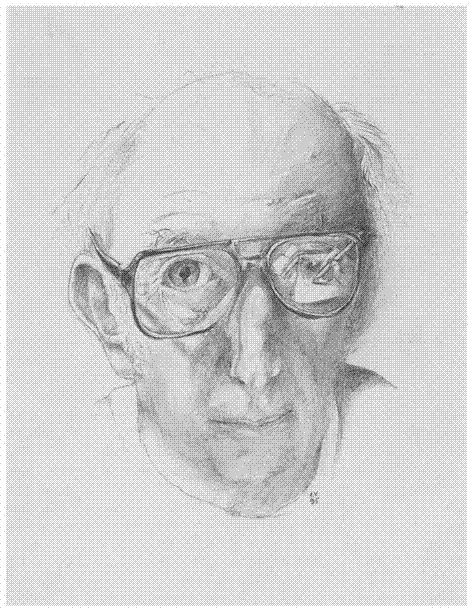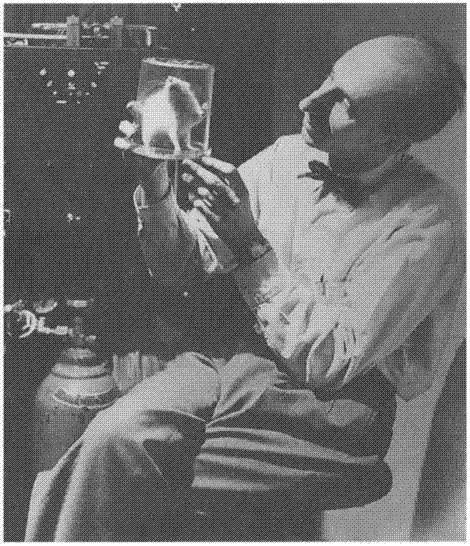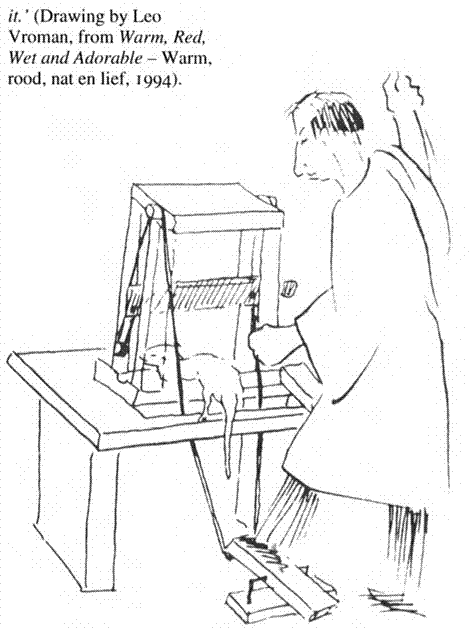|
| |
| |
| |
The Delicacy of a Rain Forest
About the Poetry of Leo Vroman
Leo Vroman's collected poems (Collected Poems 1946-1984 - Gedichten 1946-1984), published in one volume in 1985, amount to over 1,000 pages; but the collection is far removed from any notion of an ornate tombstone on a productive life. Four new volumes of original Dutch poetry have since seen the light, as well as ‘Love, Greatly Enlarged’, an English adaptation by Vroman of his lengthy narrative poem ‘Liefde, sterk vergroot’ (1981), linking his love for mankind and for his wife Tineke - to whom the poem is dedicated - with his research into the properties of proteins in the blood. In the Dutch volumes - Fractal (Fractaal, 1985), Dear Indivisibility (Dierbare ondeelbaarheid, 1989), As I Was Still Alive (Toen ik nog leefde, 1991) and All Godforsaken Night (De godganselijke nacht, 1993) - Vroman has rejuvenated his language and allowed it, more than ever before, to be crossfertilised by science.
The early poems of Leo Vroman (1915-) already show a delight in playing with language as well as a strong biological point of view. From the very beginning, Vroman's poetical world teems with life, with the growth, changeability and decay of organisms. It's a mesmerising world, expressed in a language full of associations, neologisms and colloquialisms.
Vroman, who is a Jew, managed to make his escape from the Netherlands after the German invasion in May 1940, leaving behind his fiancée Tineke, whom he would not see again until seven years later. In Batavia (nowadays Jakarta) he completed his biological studies and developed his talents as a poet and illustrator. However, his freedom was short-lived; as the Japanese made their advance towards Indonesia, Vroman was drafted into the Dutch colonial army. It didn't take long before the Dutch resistance collapsed. Vroman was made a prisoner of war by the Japanese in March 1942 and held in various camps on the island of Java and in Japan. Some of his poems from this period show how severed he felt from life and the love of his life. In the gloomiest of them all, ‘Night’ (‘Nacht’), God - still a familiar figure in Vroman's early poetry - is out of sight, but during the most silent nights God maybe still hears ‘the sick rustling of my thoughts / that flap themselves to pieces outside on his pane.’ These poems are full of windows, blackened or staring windows, and walls.
| |
| |
After Vroman's release from the pow camp, he was first taken to Manilla, in September 1945, where he was officially discharged from the Dutch army. From Manilla he travelled to New York where his uncle convinced him that he shouldn't go back to Europe if he wanted to dedicate his life to research. It wasn't until September 1947 that Tineke came over to join him. They lived in New Brunswick before finally settling in Brooklyn ny where they raised a family. After Vroman's reunion with Tineke, his poems become more playful. Humour and self-mockery offer a light-hearted counterpoint in a poetry which explores the hidden reaches of life and death. In a poem entitled ‘About People’ (‘Over mensen’) Vroman states that he'd better shut up about butterflies, windows and water which inhabit his dreams and write ‘a verse for people about people’. People then are, in unique Vroman-style, described as ‘those taller than tall animals / with nodes and twiggy branchings on their extremities / which become frowned and knotty from sheer misery. / We should adorn them with downy lids, / these nervetubers, seats of the intellects / which nourish the last tufts of their

A self-portrait by Leo Vroman (1995).
| |
| |
furs / with a humus of their thoughts / fuming out of their uppermost walls.’
This haphazard translation may suggest Vroman's poetical subject matter but it doesn't do justice to his play with the Dutch language. In Vromanidiom, many verbs and some nouns derived from verbs begin with the prefix ‘ver-’. Words with this prefix abound in the Dutch language, filling almost an entire volume of the comprehensive Dictionary of the Dutch Language (wnt; Woordenboek der Nederlandsche Taal - see The Low Countries 1994-95: 288-290). Usually these words indicate a process, a gradual development. One of Vroman's favourite words is ‘vergaan’: to decay, but he doesn't need the wnt to come up with a host of ver-words of his own invention, like ‘vertwijgsels’ (twiggy branchings), ‘verfronzen’ and ‘verknopen’ (to become frowned and knotty). This is just one of the techniques Vroman uses to create a poetical world of extreme liquidity. Neologisms like ‘zenuwknollen’ (nervetubers), smooth enjambements and a frequent use of synaesthesia reinforce this impression of continuous motion. Unlike the work of experimental colleagues at the time, Vroman's poems still rhyme, but it's not a static kind of rhyme; it's more like a loosely draped garland, in tune with the changeable nature of Vroman's world. A prominent Dutch critic, Kees Fens, has clearly indicated how Vroman's rhyme differs from traditional rhyme: ‘(the rhyming words) don't both lose something in the process, they don't suavely melt together to shape a new meaning. In Vroman's poetry the rhyming words, precisely because of their rhyme, emphasise their uniqueness. Both remain singular; rhyme is used not to demonstrate congeniality but as proof of strangeness.’
Vroman breaks down the boundaries between humans and animals, animate and inanimate, day and night, inside and outside and, ultimately, between himself and the world he wants to grasp in his loving embrace. Elements from one category seep into the other, transforming reality into a phantasmagorical universe. Often the poet represents himself while dreaming, and then in his dream quirky things gradually dissolve all natural dimensions. Listen for instance to the first stanza of one of Vroman's English poems, ‘Another Dream’: ‘Once I was caught in this dream: / I slept that my room was shrinking. / At the dead end of all thinking / I woke up with a scream.’ In the narration of this poem, the poet wakes up in someone else's grave, a recurrent theme in Vroman's poetry. In this case, it's a grave occupied by a girl whose organs ‘(...) dreamily creep / like puppies, blind, velvety.’ The girl begs him to ‘break this fat roof away!’, but all he can do for her is make her human again by communicating with her. In the end, the poet wakes up from his dream.
Another dreamlike event is depicted in the poem ‘The Bird’ (‘De vogel’) from Going Sleepwalking (Uit slaapwandelen, 1957). The poem begins with an idyllic country scene full of innocent, diminutive sweetness, when suddenly the sky seems oppressive and a bird appears on the scene. The bird - which looks like a gentleman - is in a rather dejected mood. He tells how he has lost his birdlike qualities as a result of associating with people. He cannot fly any more and is therefore unable to join his father ‘in his valley / under the seaweedtrees / where skypearls descend / at the long day's end.’ The poet tries to help the bird - which turns into a female - by throwing her into the sky, but she clasps him in an eerie embrace which leaves him covered with feathers. The following morning the poet wakes up to a changed
| |
| |
landscape and the extreme sense of solitude that results from a loss of illusions. It is as if the bird has taught us a lesson about the human condition, and we have become all the sadder and the wiser for it. In a poem written about thirty years later, ‘With Other Eyes’ (‘Met andere ogen’, in Fractal), another strange visitor arrives from the sky, who also changes into a woman. This visitor doesn't strike a tragic figure: he / she can fly, has even visited all the planets of the universe, but it's the earth which most enthralls him / her. Saturn was a ‘gasfumeland’ and Mars a ‘blooddesertfield’ but the planet Earth has taught this cosmic visitor human emotions: ‘The delight of embarrassment, / red rims on the red roses / little children who pee and then blush (...)’ The mood of the poem is one of gratitude for being part of this dear, dear Earth.
This theme of Earth as his darling planet and his all-encompassing love for people (Tineke in particular) plays a considerable role in Vroman's poetry. Vroman reaches out to his readers, inviting them to be part of his everyday life. Vroman's readers know he has two daughters and that he likes to walk to Sheepshead Bay with Tineke. They know his feelings for America (‘Flesh land from which I live along’) and for his small native country. But Vroman's poetry never becomes too homely and cozy. The limitations of time and space add a tragic note to the existence of people on this planet. They are threatened by various monsters: ‘the monster Oblivion’ and the ‘Voracious Monster Entropy’ but also by monsters of their own invention such as violence, murder and war. Since his volume Curious (Nieuwsgierig, 1980) Vroman has written a good number of anti-war poems, all without any connotation of propaganda. It's Vroman's unique voice that we recognise, an angry, pleading or desperate Vroman at that: ‘well? what happens if the thunder / of these nukesick times / whitewhisks

Leo Vroman, in his younger days, with a rather suspicious-looking experimental rat.

‘Fortunately, my so-called remote controlled decapitating machine was harmless enough to make only a dent in a dead rat; so I never used it.’ (Drawing by Leo Vroman, from Warm, Red, Wet and Adorable - Warm, rood, nat en lief, 1994).
| |
| |
our flesh sweeping it asunder / without form, soul or eternity?’ (from ‘Ready’ (‘Klaar’) in Collected Poems 1946-1984).
In ‘Entropy's Last Convulsions’ (‘De laatste stuipen van de entropie’) Vroman resists the belief that the only meaning of order would be chaos: ‘That the power which makes creases in the mountains / and dimples in the cheeks / also should long for the end of all that / no I'll never be convinced.’ In this poem the dead are revived: their worms taken out, they walk the streets again, holding hands. Vroman himself would be the first to recognise that this fantasy is based on wishful thinking. A later poem, ‘Beyond Progress’ (‘Voorbij de vooruitgang’), ends with the notion that there is no cure for life: ‘today master tomorrow manure / there's no other way / but it's all right the way it is.’ Yet in Vroman's last four volumes the spectre of chaos is fought with new scientific ammunition. In Fractal Vroman uses a concept introduced by B.B. Mandelbrot in his book The Fractal Geometry of Nature (1983): ‘fractal’ is a number of dimensions which is not a complete number. A point doesn't need to have one, two or three dimensions but could as well occur in a dimension of 2.3 or 3.1. One of the consequences of this concept is that chaos changes into (a complex) order. The volume Dear Indivisibility owes a lot to this new discipline of ‘chaotics’, which investigates the orderly development of chaotic processes. Vroman stated in an interview: ‘At the moment I see people as incomprehensible natural phenomena, terribly complicated, even mathematical.’ It's this sense of complexity that makes Vroman dismiss the idea that all of existence boils down to sheer chaos. Vroman's experience as a biochemist tells him that seeing things from a distance - the so-called ‘perspective’ - blurs finer distinctions. One of the conclusions in his most
recent publication, Warm, Red, Wet and Adorable (Warm, rood, nat en lief, 1994), an autobiographical look at research into blood, is that the human body is infinitely complex, ‘our last rain forest’, and should be treated with due respect.
Both time and space figure prominently in Vroman's poetical world, and increasingly so as he grows older. His volume House and Yard (Huis en tuin, 1979), illustrated by himself, consists of playful poems, distichs with a moral. One of the poems contains a dialogue between space and time: space schemes to swallow up time, but time is elusive and shies away from space's temptations. They will never mate. In ‘Wrong time’ (‘Verkeerde tijd’, in Fractal) the poet imagines himself outrunning time (which is likened to a cosmic horseman past his prime) and vanishing into space. This metaphorical representation of his death sums up a variety of emotions, from compassion, nostalgia and attachment to the earth to a feeling of doom. Since Fractal Vroman has written more poems of this nature, eschatological poems in which he imagines himself in a sort of flight through incredible spaces which interact with each other. The walls of his earliest poems, which started to crumble in the fifties, have really come down. In spite of the cosmic dimensions of these poems, it's still a very recognisable, utterly human and even vulnerable Vroman that emerges from them. Vroman's voice is unique in Dutch poetry. After reading a lot of his verse, you may feel like the poet in ‘The Bird’: your clothes show patches of Vroman-feathers and the landscape has been altered beyond recognition.
kees snoek
| |
Further reading
durlacher, jessica, ‘Leo Vroman, Dutch-American poet / biologist’, Dutch Heights, September 1990, pp. 29-32.
kuijper, jan et al. (ed.), Het Vroman-effect. Over leven en werk van Leo Vroman. The Hague, 1990.
| |
Translations and English poetry
Poems in English. Amsterdam, 1964.
Just One More World. Amsterdam, 1976.
Love, Greatly Enlarged (Tr. Leo Vroman). Merrick (ny), 1992. |
|